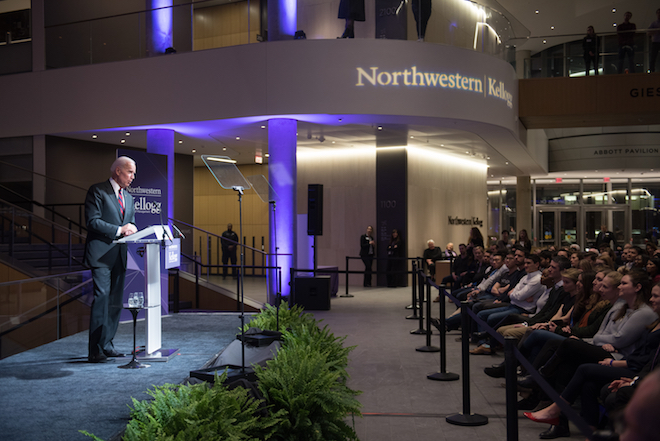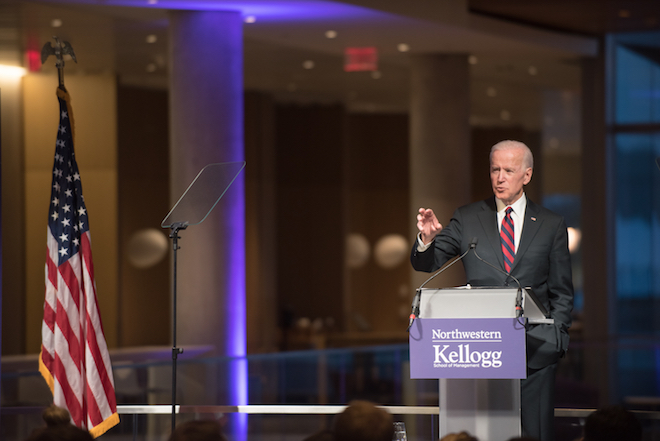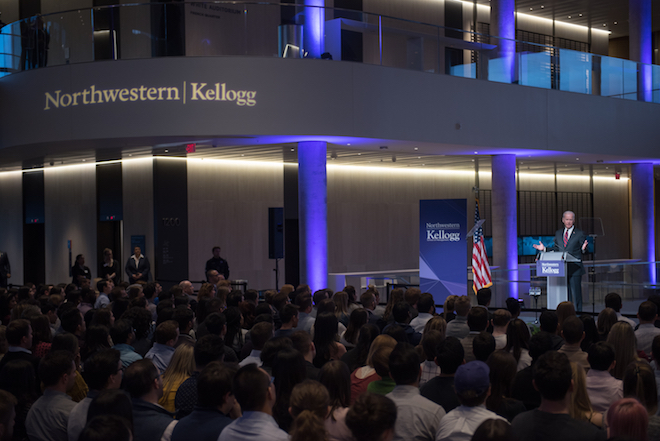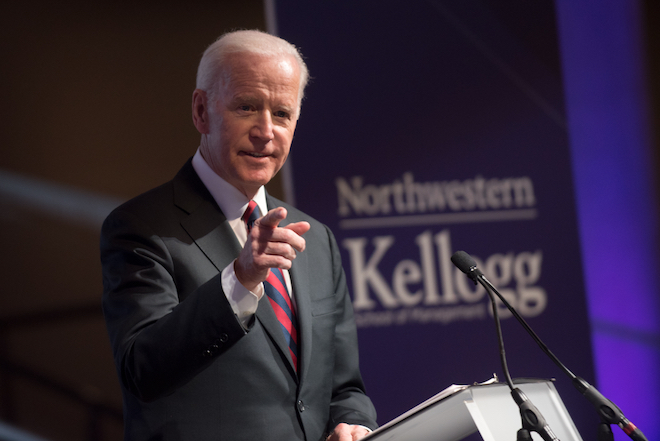Vice President Joe Biden spoke at Kellogg School of Management at Northwestern University Friday, March 9, to address the unequal economic growth in America.
Photos by Rob Hart / Kellogg
When former Vice President Joe Biden said, “Raise your hand if you think that 12 years of education is sufficient to compete in the 21st century,” to a packed audience of Kellogg students and faculty, not a single person raised their hand.
Biden spoke about the multifaceted implications of unequal economic growth across, the state of the economy and his hopes for the American people at Kellogg’s Global Hub on Friday.
Though a recent upswing in jobs has some analysts predicting strong economic growth through 2018, the divide among cities and towns across America persists. In the U.S., 24.6 percent of households earn at least $100,000 per year, while 22.3 percent of households earn less than $25,000 per year, according to the Environment Rating Scales Institute.
During her opening remarks, Kellogg Dean Kelly Blount spoke about the economic state of the U.S., recognizing that there is “uneven growth across our country, across our cities, across our towns, across our states.”
After noting that Blount is the only female dean of a major business school, Biden expressed hope for the future for women and stressed the necessity of recognizing and including them, saying, “things are changing.”
“There’s a Chinese expression, I hope that you guys know it: Women hold up half of the sky,” Biden said. “In order for a country in the 21st century to succeed, I mean this sincerely, it has to husband all of its assets. It cannot leave half of its brainpower, half its mission, half its courage, half of its capability, half of its stride behind.”
As Biden referred to unequal economic growth, he insisted that inequity is about far more than the wealth divide – it’s about “places” and how “for decades in America, we’ve seen cities and towns moving in different directions, experiencing very different fates.”
“Rural towns saw young people leave for the promise of something new: cities and suburbs across the country that have buckled under the weight of decades of stagnant wages,” Biden said. “If you come from these towns, if you’ve lived in these towns, you’ve seen it. You’ve seen it in the eyes of your parents, your neighbors. You can see it in the faces of these people, still proud, but wondering what happened to their shot. What happened?”
Having lived through the collapse of the coal industry in northeast Pennsylvania, Biden empathized with those whose cities have “not thrived,” referring back to advice that his father gave him. Biden emphasized that employment and dignity are inextricably tied.
“A job’s about a lot more than a paycheck," Biden said. "It’s about your dignity. It’s about your respect. It’s about your place in the community. … It’s about being able to look your kid in the eye and say, ‘Honey, it’s going to be OK,’ and mean it.”
While speaking about inequality across America, Biden said America’s unequal economic distribution has fostered an opportunity gap, focusing on factors like education and one's community that can make all the difference in a child's future.
“A poor child in San Francisco has twice the chance of making a top income as one born in Detroit or Wilmington or Saginaw or Springfield," he said. "Twice as likely. It’s like you’re born in different countries."
Biden illustrated how increasing wages could offset unequal economic growth and positively affect people's standards of living, saying that families will have barriers to growth so long as they are not permitted to succeed.
“We’re not going to see families flourish if they’re worrying about whether or not they can take their kid to the doctor,” Biden said. “We’re raising the standard of living, not just their wages. We’re raising their standard of living, their attitude about what they can be, their happiness.”
MBA candidate David Mesham said Biden “elevate[d] the conversation” from a class-focused conversation of wealth to one that considers the “geographic implications” of the unequal distribution of wealth in the U.S.
Referring to disparate economic growth, Mesham said, “There are unique solutions that can be tailored specifically to that problem that I don’t think that we’ve thought about on a widespread scale. I think that it’s an interesting way to shape the conversation in a way that might actually be able to get things done.”
During Biden’s discussion of the discourse surrounding American politics, Biden asked the audience, “How many of you are worried about our democracy, about institutional stability?”
“Our political system is broken. Both parties look at each other as the enemy," Biden said. "What the hell is happening today? What is the dialogue today in American politics? What is the dialogue? It’s got to stop.”
Despite his statement that the political system is broken and extremely polarized, and despite the mounting inequality across the U.S., Biden remained hopeful as he discussed America’s future.
“I’m optimistic, I’m not a pessimist. Every time you read about me in the last eight years, I’ve been referred to as the ‘White House optimist,’” Biden said. “Folks, pick your heads up. This is the United States of America. There’s not a damn thing that we can’t do.”



